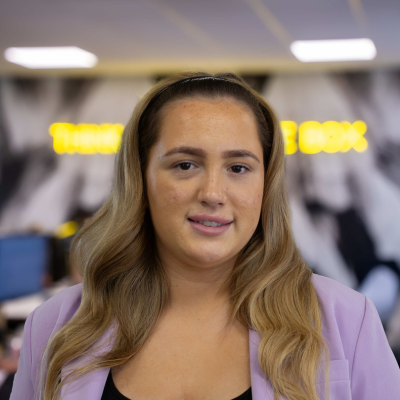Interview With A Speech And Language Therapy Assistant: Emilia Muntoni
02 May, 20241-2 minutes
In this blog, you will learn:
- The academic journey of a Speech and Language Therapy Assistant.
- The skills and characteristics needed to become a Speech and Language Therapy Assistant.
- Why it’s important to balance self care and professional growth as a Speech and Language Therapy Assistant.
- Where the latest Speech and Language Therapist jobs are and how to apply for them.
According to the Royal College of Speech and Language Therapists, there are currently long waiting lists to access speech and language therapy in many areas of the NHS. Figures from England show that in January 2023, 67,774 children were on a waiting list for speech and language therapy with 35% of these (almost 24,000) having been waiting more than 18 weeks.
There is a huge demand for Speech and Language Therapists nationwide, to decrease the waiting list time and help those in need.
We recently caught up with Speech and Language Therapy Assistant, Emilia Muntoni to hear her thoughts on this rewarding career choice
After qualifying as a Speech and Language Therapy Assistant in 2023, Emilia is now hoping to become a fully qualified Speech and Language Therapist!
Emilia, tell us about your experiences so far
I shadowed Speech and Language Therapists who were working with adults within the acute ward and children on their first referrals at the Leicester Royal Infirmary Hospital.
This has been an indispensable experience which has consolidated my dedication and passion to become a Speech and Language Therapist.
I’m currently working alongside adults with complex autism and learning disorders, assisting them with their speech therapy in a private hospital.
Tell us about your academic journey
At university I studied English Language and Linguistics. During my undergraduate studies, I explored various aspects of language including discourse analysis, psycholinguistics and sociolinguistics.
My coursework, practical experiences and research, led me to develop a strong understanding in acquisition and language structure.
What inspired you to become a Speech and Language Therapy Assistant?
Ever since my A Levels in English Language, Psychology and History (English Language and Psychology being my top subjects), I started looking into careers that would blend the two together and speech therapy came up.
Since I didn’t have direct experience working in the field, I was apprehensive to have a niche undergraduate degree in speech therapy.
Instead, I decided to work towards a degree that could work as a pathway to get into the field but also gave me options to branch out into other fields, in case I discovered that speech therapy wasn’t for me.
I managed to find volunteering experience shadowing a Speech and Language Therapist in my third year of university and applied for a MSc in speech therapy when I finished my degree.
I didn’t get into the program there and then and was told that I lacked experience. That’s when I applied for a Speech Therapy Assistant job and I adore it. I’ve applied for the program again and keep my fingers crossed to become fully qualified.
What are your career aspirations?
My career aspirations are to get my MSc degree and become a fully qualified therapist. There isn’t a direct clientele that I want to work with, I’m open to all, especially since I have become so aware of the many different settings there are (learning disability and autism, CAMHS, schools, community, social care, forensics, stroke wards, cancer patients and so on).
I aspire to help others and try to allow them to have a better quality of life in terms of their communication and/or dysphagia.
What skills or characteristics do you need to become a Speech and Language Therapy Assistant?
- Empathetic.
- Good people and communication skills.
- Good time management.
- Flexible.
- Adaptable.
Do you have any professional goals?
My goal as a future Speech and Language Therapist is to provide compassionate care, personalised therapy, and evidence-based interventions to individuals of all ages and backgrounds.
I’m committed to promoting equal access to communication and ensuring that everyone can participate fully in society. I believe that effective communication is the key to building strong relationships, fostering inclusivity and creating supportive communities.
Why is it important to balance self-care and professional growth as a Speech and Language Therapy Assistant?
It's important to have a good balance of self-care and professional growth as a Speech and Language Therapy Assistant because it ensures personal wellbeing and professional effectiveness.
I work in a complex to severe learning disorder and autism spectrum disorder hospital where the days are difficult to plan and it can be very busy. Preventing burnout is vital due to the emotionally demanding job.
It’s equally important for professional growth to take some time out, if you take time to recharge, you can return to professional duties with renewed energy, creativity and motivation.
What do you do to balance self care and professional growth?
Something I do to balance self-care and professional growth is to try and recognise the early stages of a burnout before it happens and booking off the odd day or using a weekend for pure relaxation and recharge.
I exercise regularly and fit this around my long hours because the positive impact from exercise is not only physical, but mental too, it allows you to switch off.
I have set myself work and personal boundaries such as switching my laptop off and leaving it off over my out-of-work hours, not downloading my work email on my phone and prioritising personal life outside of work.
I also think it is important to continue with education. I have monthly supervision where I use it as a space to talk about my progress but also find new things out, such as new techniques to use. It's so important to ask for help if you need it, never be afraid to ask.
Speech & Language Therapist jobs
If you’re searching for your next Speech & Language Therapist job, why not take a look at the latest vacancies, or simply upload your CV to be notified when a relevant position becomes available.
Recruit Speech & Language Therapists
As healthcare recruitment specialists, we support local authorities and private sector businesses nationwide with their temporary, interim and permanent recruitment needs.
If you’re struggling to fill a Speech & Language Therapist vacancy, why not get in touch with our healthcare specialist, Natalie Boaler on 01772 954200 to see how we can help?
Share your experience
Every individual brings a unique set of experiences, thoughts, and insights to the table. We believe in giving a voice to a community of professionals to inspire positive change and champion reform in the healthcare sector.
If you work in the healthcare sector and would like to share your own personal and professional experiences, we’d love to hear from you. Perhaps you have a different perspective, could offer a fresh angle, or want to challenge assumptions.
Simply reach out to our Head of Content, Nicole Sherwood, to discuss a collaboration which makes your voice count.
Who is Spencer Clarke Group?
Established in 2017, we’re a vibrant and progressive recruitment agency based in the heart of the North West.
We continually reimagine the recruitment process to challenge convention and defy expectations; from creating a better recruitment experience to remodelling employee engagement, we thrive off doing things differently and turning heads along the way.
We operate in two sectors:
Eeven specialisms:
Healthcare, Social Care & Nursing
Corporate Functions & Business Support





